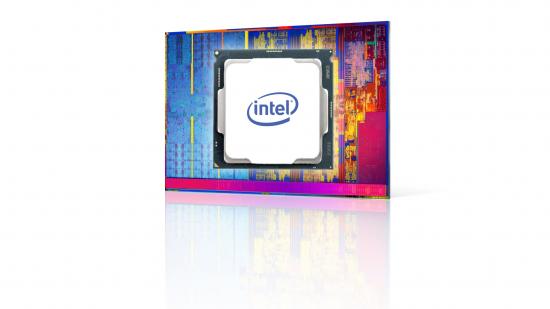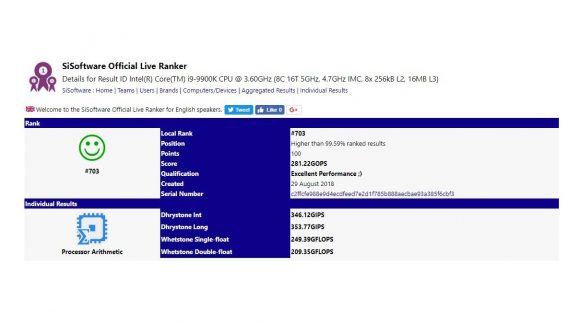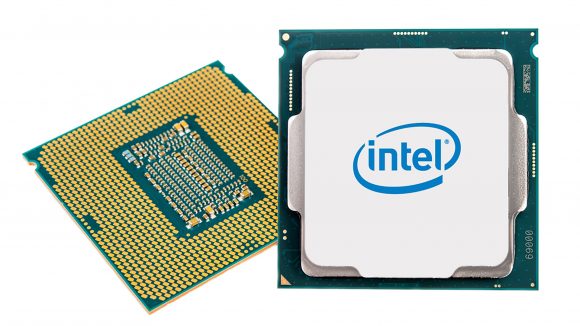Intel’s eight-core, 16-thread Core i9 9900K has appeared on the ever-reliable SiSoft benchmark database displaying a healthy relative performance lead over the similarly specced top-end Ryzen 7 2700X. The 9900K shows a score of 281.22GOPS (that’s giga operations per second to you and me) compared with the 243.40GOPS score of the 2700X.
With the highest-spec new Coffee Lake processor starting to appear in the SiSoft Sandra database, and using its own name this time around, that’s a good indicator that the launch is creeping ever closer now. We’re anticipating the new Intel chips to launch a little while after the upcoming Z390 motherboards appear, which would put the Intel i9 release sometime around October or November this year.
That said, there’s a good chance we could be in the same position as we were with the first Coffee Lake launch of late last year, where initial samples went out to us reviewers for essentially a paper launch with practically zero public availability until the start of 2018. That’s because the demise of Intel’s 10nm node has put increasing pressure on the 14nm production process creating an apparent shortfall of available Intel 14nm processor silicon.
If you’re an Intel fan, however, you will probably be quite excited at the fact that the new Core i9 9900K is already presenting a 16% performance lead over the competing Ryzen 7 2700X. There are obvious caveats to this. There’s the classic fact that early benchmarks, with early drivers, on testing platforms, aren’t 100% reliable in terms of final performance.
It does, though, match up with previous i9 9900K 3DMark leaks that have appeared online around a month ago.
But the most important factor is the relative clockspeed of the two processors. The AMD CPU is running at a fairly modest 4.28GHz out of the box, and it’s actually pretty tough to get it to budge from that frequency. The i9 9900K, on the other paw, is listed as running at a straight 5GHz, which would always give it a bit of an edge.
That’s a frequency boost of 17% over the 2700X, which apparently delivers it a 16% lead in performance terms. Surely it can’t be as linear as that in the final reckoning…
| Cores | Threads | Base | Turbo | Cache | TDP | Price | |
| New – Core i9 9900K | 8 | 16 | 3.6GHz | 5GHz | 16MB | TBD | TBD |
| New – Core i7 9700K | 8 | 8 | 3.6GHz | 4.9GHz | 12MB | 95W | TBD |
| Core i7 8700K | 6 | 12 | 3.7GHz | 4.7GHz | 12MB | 95W | $359 |
| Core i7 8700 | 6 | 12 | 3.2GHz | 4.6GHz | 12MB | 65W | $303 |
| New – Core i5 9600K | 6 | 6 | 3.7GHz | 4.5GHz | 9MB | 95W | TBD |
| Core i5 8600K | 6 | 6 | 3.6GHz | 4.3GHz | 9MB | 95W | $257 |
| New – Core i5 9600 | 6 | 6 | 3.1GHz | 4.5GHz | 9MB | 65W | TBD |
| Core i5 8600 | 6 | 6 | 3.1GHz | 4.3GHz | 9MB | 65W | $213 |
| New – Core i5 9500 | 6 | 6 | 3GHz | 4.3GHz | 9MB | 65W | TBD |
The difference could be just how far past 5GHz it can go with overclocking and, more importantly, how many cores are actually going to be running at that 5GHz speed with stock settings.
It’s highly likely the SiSoft database is only listing the top speed the 9900K hits with single core Boost frequencies, meaning that the actual multi-core frequency could be much lower during the pre-launch testing, potentially closer to the 4.7GHz mark.
That would actually make the performance per clock difference wider than it might initially appear, with a genuine all-core 5GHz result being even further ahead of the top AMD Ryzen chip.
This is also just the multi-threaded synthetic performance numbers we’re getting right now; with Coffee Lake’s traditional gaming frame rate lead, the top-end 9900K and 9700K could become the go-to chips for high-end gaming rigs.
That non-HyperThreaded eight-core, eight-thread Core i7 9700K is also listed on the SiSoft database, showing a much closer performance differential between it and the 8700K it is essentially replacing. The 9700K’s benchmark score of 210.13GOPs means it’s only 8% higher than the 8700K at 194.46GOPs.
That’s a lot more along the lines of what we would expect from a straight eight-core CPU going up against one, from pretty much the same family of processors, with 12 threads.
With the new generation of Intel processors on the way what does that mean for AMD? Will we finally see the Ryzen 7 2800X make an appearance? Or will Intel price itself out of contention again, with another paper launch giving AMD the win?


